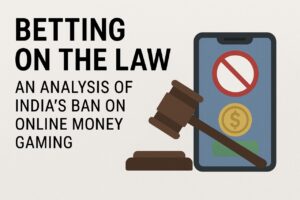1. When Silence Speaks Louder Than Justice- The Story of a Borrower
Neha was finally settling into her new home in Gurugram. The move had been tiring, but she felt a sense of relief, new beginnings, and new opportunities. She even took the extra step of informing her bank about the change of address, carefully submitting every document they asked for. With their acknowledgment slip in hand, Neha believed she had done her duty. Months passed, and life moved on. Then, out of nowhere, her world began to collapse. One evening, a relative from Delhi called in panic, a court order had been pasted on the door of Neha’s old house. Shocked and confused, she rushed to find out what had happened. To her horror, she discovered that her bank had initiated loan recovery proceedings, but all notices were sent to the address she no longer lived at. She never got a chance to defend herself. The court, assuming she was deliberately absent, passed an ex parte order branding her a defaulter. Neha had done everything right, yet the system failed her. The sleepless nights that followed weren’t about money alone. It was the fear of losing her dignity, the stress it placed on her family, and the helplessness of being punished not for negligence, but because the bank chose to ignore her truth.
2. The Legal Duty to Serve Notices Properly
Neha was left unheard. In law, one of the most basic principles of natural justice is “audi alteram partem”- let the other side be heard. This means no one should be condemned unheard. To ensure this, courts and tribunals require that all notices must be served at the correct and current address of the borrower.
Banks are not free to send notices wherever they like. They are bound by procedure. Under the SARFAESI Act, CPC provisions, and RBI’s fair practice codes, the notice must reach the borrower in a reasonable and proper manner.
When a borrower has shifted to a new address and this is on record (either updated with the bank, or evident through communications like new contact details, EMI payments, or KYC updates), the bank cannot continue to send notices to the old address and then claim, “We complied with the law.”
If notices are sent to an address where the borrower no longer lives, it amounts to denial of natural justice. Courts have repeatedly held that service must be real, not just ritualistic.
3. How Banks Exploit This Loophole
In practice, many banks deliberately keep sending notices to the borrower’s old address, even when they are aware that the borrower has shifted. Why? Because if the notice never reaches the borrower, the borrower cannot appear in court or DRT. This makes it easy for the bank to get an ex parte order, a decision passed in the absence of the borrower.
This tactic turns the law into a weapon against the very people it was meant to protect. Instead of giving borrowers a fair chance to present their side, banks sometimes use technicalities of service to silence them.
The result? Borrowers only find out after the damage is done, when properties are auctioned, or recovery agents come knocking. By then, challenging the order becomes an uphill battle.
4. Courts’ View on this problem
Indian courts have repeatedly emphasized that proper service of notice is the foundation of natural justice. If a borrower is not made aware of the proceedings, any order passed can be challenged as a violation of their right to be heard.
For instance, courts have held that simply sending a notice to an outdated address, when the bank is aware of the new address, does not qualify as valid service. The principle is simple: a fair trial cannot exist without fair notice.
Even in debt recovery cases, the judiciary has reminded banks and tribunals that recovery cannot come at the cost of procedural fairness. An ex parte order obtained through faulty service may give banks a short-term advantage, but it undermines the very credibility of the legal system.
5. Why Banks Exploit Address Loopholes
Banks are fully aware that borrowers often change their addresses, sometimes due to job transfers, sometimes because of financial pressures, or even family reasons. Yet instead of making genuine efforts to serve notices at the current address (which they usually have on record from loan account updates or KYC documents), they choose the easier route: send it to the old address.
Why? Because if the borrower never receives the notice, the court may proceed ex parte, meaning the bank wins without opposition. It saves them time, effort, and questions. In other words, the “systematic silence” of a borrower becomes the bank’s strongest weapon even when that silence isn’t intentional.
This is less about justice and more about strategy, where the technicality of an outdated address becomes a shortcut to judgment.
6. What the Law Says About Proper Service of Notice
Indian law is not blind to this issue. Courts have consistently held that “service of notice must be real and effective, not just a formality.” Under the Code of Civil Procedure, 1908, Order V lays down that summons must be served at the correct and last known address of the defendant.
Moreover, Reserve Bank of India (RBI) guidelines and KYC norms require banks to maintain updated addresses of borrowers. If a borrower has officially updated their address in bank records, sending notices to the old address is not just negligence; it amounts to denial of natural justice.
Even under the SARFAESI Act, 2002, where banks issue demand notices before taking possession, courts have emphasized that the borrower must have a real opportunity to respond. If notices are deliberately sent to the wrong address, any ex parte order obtained can be challenged as void and unfair.
7. Conclusion- A Call for Fairness, Not Just Formality
Address change is a simple reality of life; people move for jobs, marriages, or better opportunities. But when banks cling to old addresses to push ex parte orders, it turns a procedural gap into a weapon. The law was never meant to punish silence born out of ignorance.
Courts and regulators must insist on genuine service of notice through updated KYC, email, mobile, or even Aadhaar-linked communication. Borrowers deserve a fair chance to defend themselves. After all, justice loses its meaning if it is delivered without the knowledge of the person it is meant for.
-By Ritika Agarwal
Between Truth and a Lie: How Prejudice Silences Women Victims of Abuse
Rukhsar, 29, walked into a police station in Ghaziabad with bruises and a diary documenting years of abuse. She was met with suspicion, not support.



